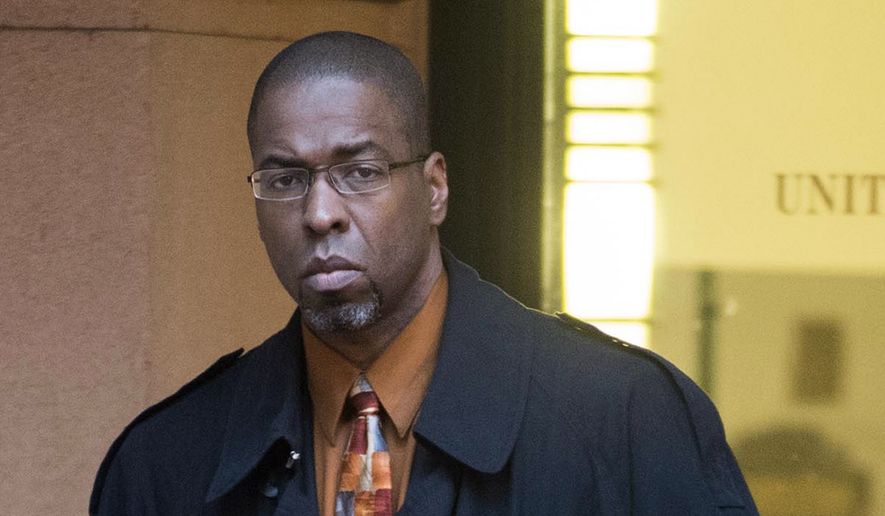ALEXANDRIA, Va. (AP) — The list of leakers sent to prison for exposing government secrets is one name longer with Monday’s 3½-year sentence for former CIA officer Jeffrey Sterling.
Although his lawyers expressed relief that the sentence was relatively light compared with the decades that could have been imposed, advocates for whistleblowers and journalists saw it as further evidence of the unequal treatment given to those whose disclosures are seen as an embarrassment to the government.
The disparity, they say, was reflected clearly by the fact that former CIA Director David Petraeus’s name is not on the list of those going to prison, despite his conviction just last month for disclosing classified information.
Sterling, 47, of O’Fallon, Missouri, was convicted of leaking details of a secret mission to thwart Iran’s nuclear ambitions by slipping flawed nuclear blueprints to the Iranians through a Russian intermediary. He faced a term of 20 years or more under federal sentencing guidelines.
Former Secretary of State and National Security Adviser Condoleezza Rice testified at Sterling’s trial that the mission was one of the few options available to the U.S. as it sought to stop Iran’s nuclear program.
After the sentencing, defense lawyers Edward MacMahon and Barry Pollack thanked U.S. District Judge Leonie Brinkema for what they considered a fair sentence. They said they still plan to appeal the conviction.
“In some cases, the jury gets it wrong,” Pollack said. “That said, the judge today got it right.”
But Robert Scheer, a former Los Angeles Times reporter and now a journalism professor at the University of Southern California, said he had a hard time working up appreciation for the supposedly light sentence. He said the prosecution of Sterling is part of a pattern of cracking down on leaks the government deems embarrassing.
“If the leaks support the government’s position, they never crack down on the whistleblower,” he said. In particular, he cited the example of Petraeus, who got probation last month for leaking classified information to his biographer, who was also his mistress.
He said the environment now for whistleblowers is “worse than it’s ever been,” not only because of the long list of leak prosecutions under the Obama administration but also because of the pervasiveness and effectiveness of surveillance technology that makes it easy to know who is talking.
Jesselyn Radack, an attorney with the Government Accountability Project who has represented multiple whistleblowers facing federal prosecution, including Edward Snowden, called the judge’s sentence the “least worst option.” But she said Sterling should not have been convicted and should not have been given jail time, given Petraeus’ sentence.
“If you’re politically well-connected or powerful, you don’t have to worry about being charged with espionage or leaking,” she said.
In imposing her sentence, Brinkema compared Sterling not to Petraeus but to another case that defense lawyers had cited in their papers. John Kiriakou, also a former CIA officer, pleaded guilty in 2012 to disclosing the identity of a covert agent to a reporter and was sentenced to 2 ½ years in prison. Brinkema said the offenses were similar but Sterling should get a slightly longer sentence because Kiriakou admitted his guilt in a plea bargain, while Sterling admitted no wrongdoing and went to trial.
Prosecutors, for their part, disputed the notion that Sterling was some kind of righteous whistleblower. They argued that Sterling was motivated by spite to retaliate against perceived mistreatment at the agency. Sterling, who is African-American, had unsuccessfully sued the agency for racial discrimination.
They said the evidence at trial is that the program in question ran smoothly and successfully, and that Sterling falsely portrayed it as a botched operation to New York Times journalist James Risen.
The classified operation at the heart of the trial involved using a CIA asset nicknamed Merlin, who had been a Russian nuclear engineer. Merlin traveled to Vienna in 2000 to foist deliberately flawed nuclear-weapons blueprints on the Iranians, hoping they would spend years trying to develop parts that had no hope of ever working.
Risen published details of the Merlin operation in his 2006 book “State of War.” The book suggested the blueprints had easily spotted flaws and could have actually proved useful to Iran. Experts who testified for the government at trial disagreed.
Sterling was charged in 2010 but the trial was delayed for years, in part because of legal wrangling about whether Risen could be forced to testify. Ultimately, prosecutors chose not to call Risen as a witness, despite winning legal battles allowing them to do so.
Without Risen’s testimony, prosecutors built a circumstantial case against Sterling. They introduced evidence showing regular contact between Risen and Sterling by phone and email.
Sterling showed no visible reaction when the judge imposed the sentence. He spoke briefly before the sentence was imposed but made no admission of guilt and did not apologize, as is common at sentencing hearings. Instead, he simply thanked the judge and the court staff for treating him courteously.
Prosecutors did not recommend a specific term of imprisonment but made clear that they were seeking a severe sentence. They seemed dissatisfied with Brinkema’s decision.




Please read our comment policy before commenting.